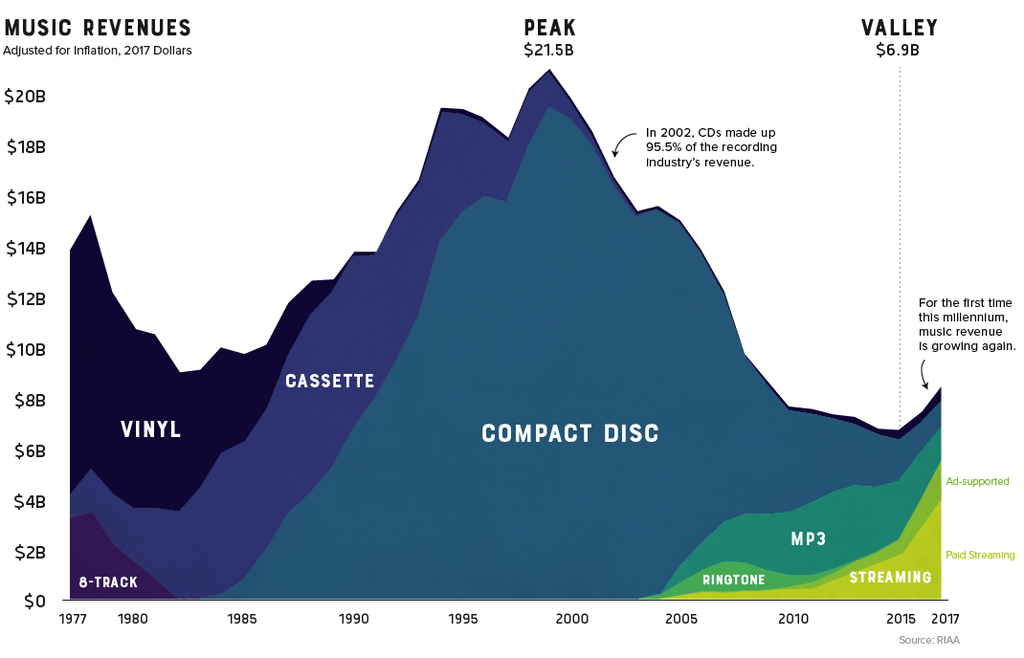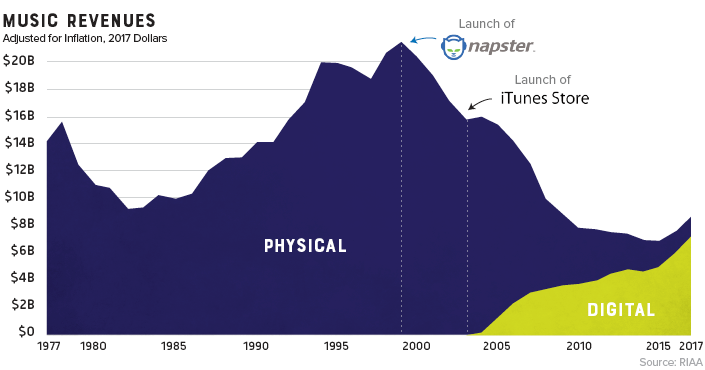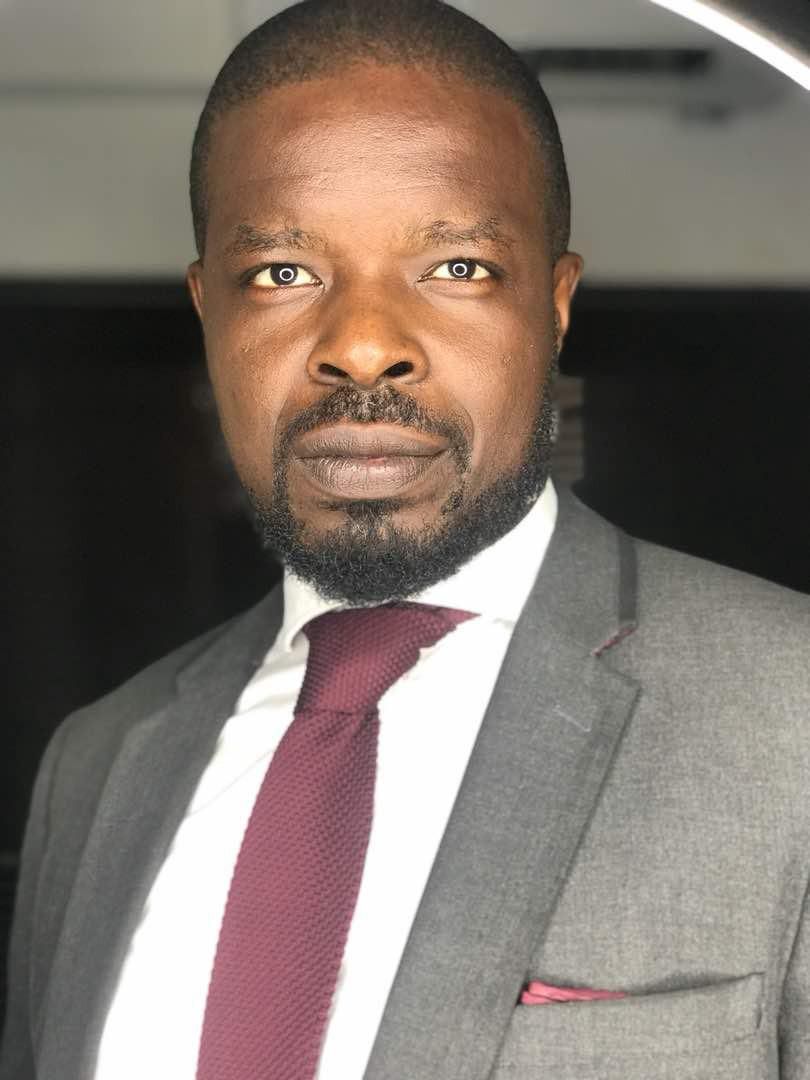Comment: On the complicated issue of music blogs and selling music in Nigeria
)
Free music is not the problem, industries, countries and systems are.
I'm about to pander to cliché, but I'm gonna say it anyway; the Nigerian music industry is very dysfunctional.
There is no structure, to begin with. Therefore, sales for artists is 'long thing.' The best avenue artists make money from is playing shows, tours, and endorsements. Nigeria is a poverty capital, people cannot even afford to eat, let alone pay for music.
Piracy, bootlegging and music blogging means you're more likely to listen to a song for free in Nigeria than you're likely to pay for or buy it.
While the number of paid Nigerian music lovers - in Nigeria - is increasing either through 'wanting to feel among' or natural evolution, the percentage of paid music listenership - through premium downloads and streaming - in Nigeria is meagre.
If various data is anything to follow, that increase wasn’t up to 3% between the last quarter of 2018 and first half of 2019.
From the estimated number of music consumers per unique Nigerian IPs in Nigeria, based on the number of downloads from freemium sites and YouTube streams, only a worrying 11% truly pay for music through paid downloads or streaming.
According to PricewaterhouseCoopers (PwC), an international accounting and auditing firm in 2014, Nigerian music sales revenue was estimated at a meagre $56 million. The firm projects sales revenues will reach another meagre $88 million by 2019. However, the industry is projected to by worth $8.1 billion by 2019.
Bear in mind, when the Nigerian government calculated the entertainment industry as part of the 2013 GDP, there was an increase from $270 billion to $510 billion.
Free music is a systemic problem that has festered over time because artists fully resigned to only making money from shows and endorsements. Even with the soaring potentials of affordable streaming, Nigerian artists still have to contend with illegal downloads - Alaba wey dey online.
Nonetheless, music blogs aided Nigerian music by capitalizing on the internet to help music circulate better in a dysfunctional industry. In fact, they helped boost artists' profiles and popularity. These artists might not have benefited from sales, but they did in popularity which resulted in bigger shows and endorsements.
They also helped to foster foreign attention in Nigerian music. At this time, in an industry that artists only have a chance - due to ignorance - at making good money off shows and endorsement, they help them create a platform and fan base that inevitably inform popularity.
There are two sides to the role of music blogs in Nigeria. You cannot effectively proffer solutions if you don’t seek to understand the problem first.
Selling music is a global challenge

While Nigeria never really had music sales prospects, to begin with, the global worry is the dwindling record sales from the world over. In the 70s or 90s, the internet was effectively non-existent to the music business.
Even though pirates would record songs off the radio and sell them, western music listeners largely had to pay for music by purchasing physical copies of albums or singles.
Music sales shot up the roof and record labels became heroes of modern capitalism. By the time music started pushing across western borders, the sales skyrocketed again.
But when stations like MTV started showing music videos, piracy found another avenue and sales found a challenge. While the '90s saw high sales in music, the mid-2000s saw a continued drop in sales. Capitalists started worrying.
They worried so much that they banded together to kill Sean Parker's Napster - that was a mistake. Even though they should have been wary, they should have capitalized on the internet. Instead, they wanted to safeguard the physical sales bag which has now nosedived in most parts of the world except in parts of Asia.
By the late 2000s to the early 2010s, physical sales increasingly got worse. While selling platinum was purely from physical sales at one point, it later grew to include online sales. Now, even streams play a major role - this includes YouTube streams.

Artists now have to 'bundle' to sell music physically. So, the point is, selling music is a global problem that's only worse in Nigeria.
But you see, while they are still better than Nigeria, European music markets are a far cry off American sales.
Where the RIAA certifies an album platinum after one million sales, Canada or the UK certifies platinum after 80,000 and 300,000 sales respectively - that's due to lower sales prospects.
Nonetheless, UK artists, for example, have taken an approach that Nigerian artists can learn from - aggressively channeling towards record sales by capitalizing on buzz and popularity created by building a fan base.
Back to Nigeria
As artists get more informed and capitalist avenues that thrive on premium music (downloads, or streaming) spring up, conversations around music sales come in not too far behind.
The idea is that music blogs are killing sales in Nigeria and fostering the scourge of terrible sales. The idea is that, if Nigerians are not forced to want to pay for music, they will not pay for music - all persuasive perspectives leaning towards truth.
If we don't canvass efforts towards it, it might ever happen. It begins with artists risking it to put their music on premium platforms and forgetting only making money through endorsements and shows. It's fairly working in the UK, but it's still a complicated issue - especially for upcoming artists.
Yes, you stand to make more money from premium sites if you put your music on them. But it's also true that people will buy music if they don't have any alternative to listen to music. Also true that music is about the artist who stands better when he sells even 500 copies than when someone downloads for free.
But who will stream or buy your music if he moves straight from having a dream of selling your music from the start to premium sales? Where's the fan base? Moreover, you can't force this conversation, you have to educate people. People - especially Nigerians - like freemium. Sometimes, freemium is also a necessity.
Don't get me wrong, moving straight to sales will work for some people, but those people will be the exception, not the rule. The rule is that building a loyal fan base is material to any career in music. The boy in Agege has no chance if he moves from recording straight to premium music. He will have no career - it's that simple.
With his audience, his greatest hope is dealing with a necessary, yet bad record deal for two to three years before branching out on his own. His audience does not have Apple Music. Most of them cannot even afford to pay for music. That artist from Agege needs to build popularity and then pivot to making money off shows and endorsement in Nigeria.
As far as going straight from recording to premium music, only alte acts can do such, but even those guys use SoundCloud. Thus, Nigerian music blogs are a necessary evil - they play a role until they don't.
I understand, free music is killing the ecosystem, but you can't throw the baby out the with the bathwater. The only way to disrupt the market is with cheap or low product - to the Nigerian mainstream. That's the only way you get their attention. The problem right now, is too multi-faceted to play the blame game or attempt to force people to buy music they cannot afford - we'd be back here soon.
The hilarious fact is that even with free music, a lot of artists are still not getting a look-in. So I guess the pro-sale capitalists will say, 'If you're not getting any love from free music, why don't you just put it up for sale and get as little as you can anyway?'
That's persuasive perspective. Artists expend a killing on recording and marketing. Making nothing is a terrible reality. This music is their job. Even for those who don't need the money, having someone pay for your music is gratification and endorsement. It lightens the mood and helps the artist create more.
The opposite of that is frustration and depression. But you see, building a fan base is necessary to make it in music. Yes, you can build a fan base is better with freemium than premium.
If you can't sell music in freemium after a few tries, maybe music isn't for you or you don't have the worthy talent or both - not everybody making music has talent. Not all of them will make it.
Even in advanced climes, megastars like Taylor Swift, Drake and Beyonce make the most money from tours, endorsements and business ventures anyway. Live Nation and Michael Rapino are the keys to life, boosting egos.
That's why I kind of see some of the points Makinde Azeez, the CEO of Naijaloaded made when he used a 'Zlatan analogy,' for example. We're all trying to make sense of a dysfunctional industry.
What we need is a conversation, not conflict. We need to find a way to do things and effectively transition from a disruptive freemium model to premium. But you see, even if we had a structure that encouraged premium to a large extent, some people will still want or need to put music out for free.
They will also have their reasons - either sentimental or strategic.
In better markets, artists still put music up for free
Free music is not the problem, industries are.
In America, Noname put her first two studio albums up for free on SoundCloud. Her fan base is growing and I proudly belong to that demographic. She can decide to make it premium, and I'd still buy. Yet, her last set of singles were still free. She has her reasons.
DIY Hero, Russ built it up from the scratch to negotiating a solid limited licensing deal with Columbia. The deal allows him to own his masters and only use the record label for distribution. Chance The Rapper won three Grammy awards off a free album, Coloring Book.
There's no one way to put your music out there. Forcing it and criticizing music blogs that essentially help build careers in a dysfunctional industry makes arguments lack context. We need to pick the right battles.
Canvassing sales is one way to solve the systemic problem we face in Nigeria, if we build an industry that is largely premium, artists can then decide if they want to put their music up for free - not because they have to, but because they choose to. However, we're doing it wrong.
The problem of selfishness: Capitalism and why artists are not getting paid as they should.
For pro-premium capitalists and proponents, their idea is to build a functional industry that gives artists a chance to effectively and directly monetize the content they spend money to create.
But it's worth noting that some of these pro-sale/pro-premium proponents on social media are championing this cause because they have or work for a capitalist platform that needs to make money off music sales - there in lies the problem.
They don't necessarily have a passion to make the industry better. They just want to make money off the dysfunction, and sites like Naijaloaded - problems in themselves - stand in their way. While it could be a case of two birds, one stone, anybody who doesn't appraise solutions, but only wants to force it shouldn't be trusted - nuanced history suggests this.
If these people understood the problems, they'd know that artists are not really getting paid like that.
Capitalists are why artists can still not get money from the little funds available from sales, telecommunications companies, and radio.
The case of COSON
We're not even claiming the money on ground.
In Nigeria, the Copyright Laws are simply inadequate to help Nigerian artists, producers, and songwriters get adequately paid for their work. In an ideal society, artists and composers are paid on everything from caller tunes to downloads, to radio plays, to licensing for events and so forth.
The structures are not in place in Nigeria and money is being lost on a yearly basis because people do not even know where to claim their dues. Even worse, Nigerian producers and songwriters, especially don’t know their rights – some even sing them away for terrible payments. Others don't even bother claiming their money.
Due to this problem, the Copyright Society of Nigeria (COSON) was inaugurated to help safeguard the interests of Nigerian artists, songwriters, and producers, with rights to any song or album, on which they can legally claim. However, there has been a case of both COSON being either limited and unable to adequately carry out its primary charge, or simply failing at some of the tasks it has carried out.
On Friday, May 12, 2019, the Music Publishers Association of Nigeria (MPAN), convened a meeting of industry stakeholders at Landmark Towers, Victoria Island, Lagos to solve some of these problems and petition the National Communications Commission (NCC) on the following grounds;
- NCC must order an immediate forensic audit of COSON accounts.
- NCC must create key directives to harmonize the PRO environment e.g same invoicing, licensing and revenue collection.
- NCC must direct all PROs to allocate 10% of the distribution for general distribution.
- MPAN/NCC/COSON/MCSN joint committee to address music publishing tariffs to determine if the rates are sufficient.
Despite having a dysfunctional industry, Olumide Mustapha, Chairman of MPAN spoke on why we are losing hundreds of millions of Naira every year in music publishing income - he is the money guy. From a fact-based perspective, Mustapha addressed the 9-figure increase in revenue streams pertinent to Nigerian music between 2017 and 2018.
He also broke down the multiple unharnessed revenue generation streams in Nigeria music and noted that despite the increased revenue, more than 60% of the possible revenue remains uncollected from the already existing platforms.

Towards the end of the event, talent manager, former rapper and songwriter, Mr. Efe Omoregbe who is known for managing 2Face Idibia apologized as a member of COSON's board for the failures of the organization.
As a credited writer of 2face's songs like, 'Spiritual Healing,' and 'Dancing In The Rain,' he highlighted the body's failure with how he gets no royalty cheques for the songs.
In the end...
The operative fact here is how we are not even collecting 80% of the already existent revenue in our dysfunctional industry. That's why I am cynical towards pro-sales/pro-premium music proponents on social media who work for capitalism platforms that thrive off streaming. They only want to increase sales.
They're not looking to help the artist or the industry, they are just looking to force a shift that might only work for them in the grand scheme. They will get their money, but who will get money for the artist? Nobody is talking about that, yet, they will claim they are fighting for the artist.
Artists and composers making money off music sales are not as straightforward in Nigeria. It involves a lot of corrupt and clustered processes.
Nonetheless, we need these conversations. We should just be careful who we have them with and how we have them. Context must be a part of all conversations.
We need to be smart with addressing issue. One plus one doesn't always equal two.

)
)
)
)

)
)
)
)
)
)
)
)
)
)